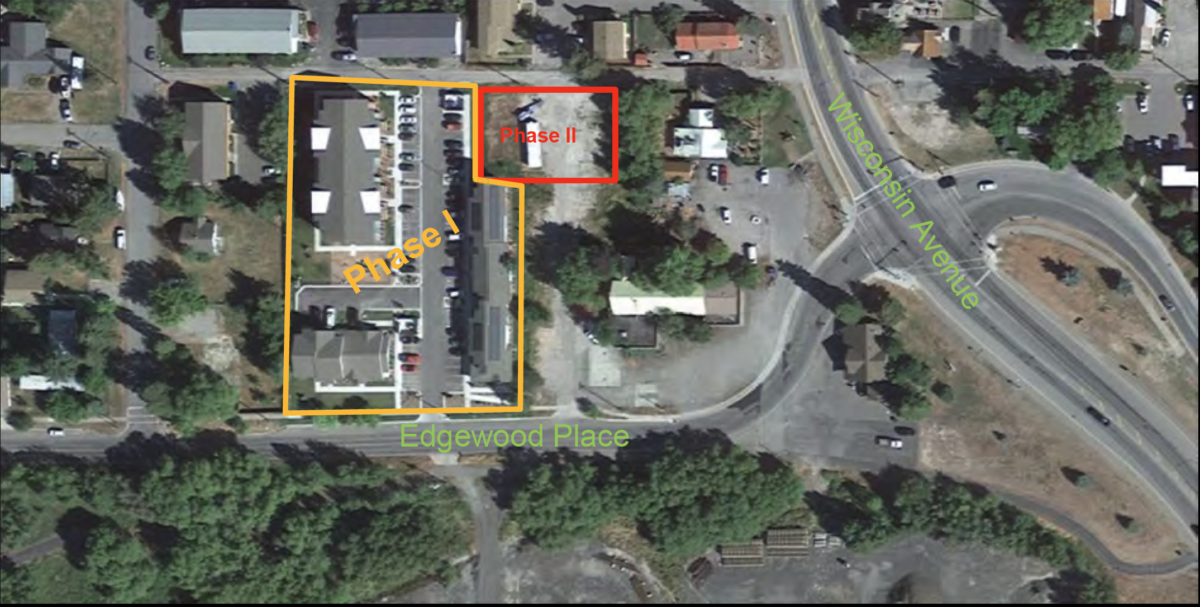Whitefish City Council Approves 18-Unit Addition to Alpenglow Apartments
The nonprofit affordable housing advocacy organization backing the project says fundraising is ongoing, with the goal of renting to households earning, on average, 80% of the area median income
By Mike Kordenbrock
A proposal to build additional affordable housing on the site of the Alpenglow Apartments was approved Monday night by the Whitefish City Council, and the director of the nonprofit leading the effort said the goal is to be ready to break ground by the winter or spring of 2025.
Called Alpenglow Phase II, the project involves the construction of a single building featuring 18 multifamily apartment units on the 500 block of Edgewood Place along the northeast portion of the lot where the other Alpenglow apartments stand. Those apartments, which were proposed by the Missoula-based nonprofit Homeward in 2019, and received occupancy in 2021, have 38 rental units spread out across three buildings, and are dedicated to people making 60% of the area median income (AMI). For context, the AMI in Whitefish is an income of about $58,800 a year, 60% of which is $35,280.
Wendy Compton-Ring, a senior planner for the city of Whitefish, told the council that the original proposal for the Alpenglow project had come with an understanding that there would be a second phase in the future, but that plans would be submitted at a later date. Last month, Whitefish’s newly formed development board voted unanimously to recommend the city council approve Alpenglow Phase II. Councilor Andy Feury was absent from Monday night’s meeting, but the remaining members of the council all voted in favor of the development.
That second phase was brought to the council this week by Housing Whitefish, a nonprofit which works with the Whitefish Housing Authority. In its planned unit development request, Housing Whitefish included requests for fewer parking spaces and a slightly higher building height than city code would normally allow, in exchange for participating in the city’s Legacy Homes Program and agreeing to rent out two of the units to people making between 60% to 80% of the area median income (AMI). The remaining 16 units could be rented to people making up to 120% AMI.
All of the units will be deed restricted and permanently affordable. The city of Whitefish’s 2022 Housing Needs Assessment identifies 820 rentals needed by 2030, of which 580 are to be priced below market rate. “While the focus of rentals in the Legacy Homes program is to provide housing for households making between 60-80% of AMI, rentals are needed above 80% and up to 120% of AMI,” according to the city staff report, which explains that the project will offer a variety of unit types, including one-, two- and three-bedroom apartments.
Daniel Sidder, Housing Whitefish’s executive director, told the council Monday night that the goal is for the 18 apartment units to be rented out to people who, when averaged together, make about 80% of the AMI. That could look something like six units at 60% AMI, six units at 80% AMI, and six units at between 95% AMI and 100% AMI.

As part of the project, Sidder said that Housing Whitefish is working with the Montana Department of Environmental Quality on a Brownfields cleanup due to some lead contamination on site.
Fundraising for the project is ongoing, and Sidder said that they could end up financing it with about half the money coming from capital and equity, and the other half coming by loan. He noted that the market is difficult for affordable housing and that there are lots of variables.
“We have a lot of work to do on our end to bring in money to this project to make it work. That’s just the reality for these types of projects,” Sidder said.
Housing Whitefish has an application pending before the state board of housing for money from the Coal Trust Multifamily Homes Program, and Sidder said if that funding gets approved there will still be roughly $2.5 million in fundraising left for the project.
At the start of the meeting, Sidder also told the council that the application website is now live for the Whitefish Workforce Assistance Program. That pilot program, which the council voted last December to provide with $200,000 in funding, offers qualifying people up to $4,800 annually for monthly rental assistance, first and last month’s rental payments, or payments to move into a new residence. Applications for the first round of funding are due March 15.
Criteria for eligibility includes living in the 59937 zip code, making under 100% AMI, working on average 32 hours a week in the 59937 zip code, and paying more than 30% of gross income towards rent. For more information, including to view the application, go to https://www.housingwhitefish.org/whitefish-workforce-assistance-info.